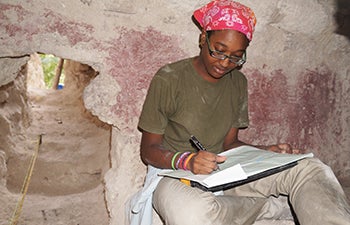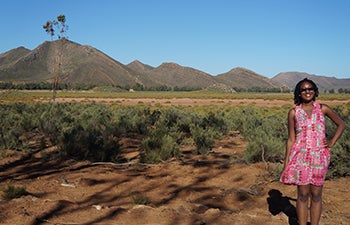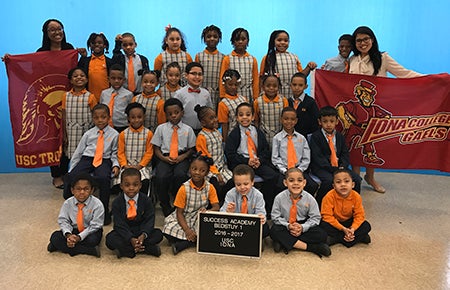
USC was there for her; now she’s there for her students
When Rachel Jones first arrived at USC as a Posse Scholar in 2011, she was in awe of the campus.
“The Doheny Library was so beautiful,” said the Queens, New York, native. “The Campus Center had just been built so there was a great vibe.”
But her most distinct memory was how she felt about the opportunity she had to learn and get involved in everything the university had to offer. “I was just so excited,” she recalled.
As a Posse Scholar, Jones was awarded a full college tuition and was connected with a group of students — her “posse” — and a faculty mentor to help the students support each other throughout their time in college. The program, sponsored by the Posse Foundation and partner universities such as USC, identifies and fosters the talent of underrepresented students and gives them opportunities to pursue higher education.
“At 17, I already understood the value of that,” she said. “I knew people were investing their time and energy in me, and I was psyched for that. It was great.”
The world is a classroom

Jones participates in an archaeological dig at the ancient Maya kingdom of El Zotz in Guatemala. Photo courtesy of Rachel Jones.
That support system was invaluable for Jones’s success. In particular, her faculty mentor George Sanchez, professor of American studies and ethnicity and history, encouraged her to stretch beyond her classes to take on research opportunities and study abroad.
“Because of him and his connections — and making sure that the Posse was well-situated at USC — I was able to take advantage of so many different opportunities,” Jones said.
Eliz Sanasarian, professor of political science, and Thomas Garrison, assistant professor (teaching) of anthropology and spatial sciences, helped her to select some of the specific overseas courses to take.
Jones, who majored in political science with a minor in archaeology, participated in Problems Without Passports courses. She studied an endangered language in Taiwan and took part in an archaeological dig in Guatemala. Another semester she spent studying in Dunedin, New Zealand.
She was also a USC Mellon Mays Fellow, a program that encourages highly qualified, underrepresented undergraduate students to pursue a Ph.D. in fields where diversity has not been historically present. Her fellowship brought her to South Africa for an international conference focusing on issues of race and inequality in the city of Cape Town.

As a Mellon Mays Fellow, Jones traveled to South Africa to attend the international conference “Cape Town: City of Contrasts.” She participated in lectures and discussions on issues of race and inequality in the city of Cape Town. Photo courtesy of Rachel Jones.
These experiences, combined with her coursework at USC Dornsife, shaped Jone’s way of understanding the world. In South Africa she noticed that the upscale neighborhoods of Cape Town included few black people. Those that she saw were domestic servants. In New Zealand, she learned about Maori culture and how the Maori population faces health disparities and higher rates of incarceration.
“You can take classes where you talk about oppression, poverty or other global challenges and ways to fix things. But once you see it in person, it’s a lot different.”
She made the topic of systemic oppression the focus of her research during her junior and senior years at USC Dornsife.
“Most of my research experiences have shown me that there are systems of oppression that are just all around me, and I should be more cognizant of it,” she said. “That by learning more about them, we can find ways to dismantle them.”
For her exceptional academic achievements, Jones was named a 2015 Steven and Kathryn Sample USC Renaissance Scholar, an honor that recognizes students who have completed a major and a minor, or a double major, in two disparate fields with a grade point average of 3.5 or better. Jones was among the top 10 Renaissance Scholars to receive a $10,000 prize for her accomplishments.
She earned her bachelor’s degree in 2015 and decided to return to New York to pursue a career as teacher.
Paying it forward
Now, as a first-grade teacher at Success Academy in the Bedford–Stuyvesant neighborhood of Brooklyn, New York, she aims to get her students just as excited about learning as she was and help them succeed in school — and beyond.

Jones (top left) represents the Trojan Family in a photo with her first grade students and co-teacher at Success Academy Bedford-Stuyvesant 1. Photo courtesy Success Academy Charter Schools.
“I really want to make a difference in their lives,” she said. “I’m teaching them how to read books, how to solve math problems. I’m setting the foundations for them.”
She also knows that because her school comprises proportionately higher numbers of children of color that they will encounter some of the roadblocks that she studied as an undergraduate.
“Through my studies and my personal experience as an African-American woman, I know some people aren’t going to expect much from them,” she said. “A lot of the things that I’ve learned while at USC have prepared me to dedicate myself to my work and do my best every single day to make sure they do well.
“It’s also cool because I’m teaching students who look like me. To work with them and show them different types of success from someone who looks like them is exciting.”
Her work in the classroom recently earned her Success Academy’s Academic Achievement Award, which honors the teachers who inspired their scholars to perform at the highest academic level across all 41 Success Academy schools.
Ultimately, Jones intends to pursue a Ph.D., but first she wants to see her students through their earliest school years.
“I want to see my kids get into middle school,” she said. “That’s my goal.”